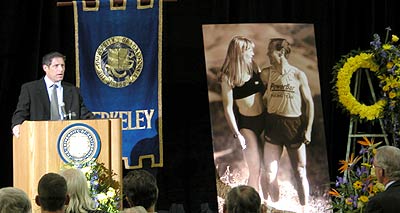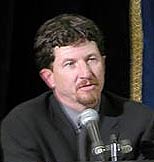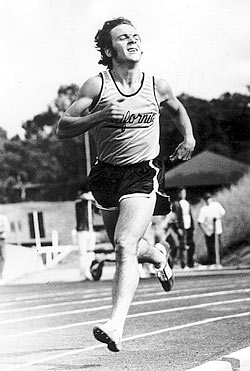UC Berkeley Web Feature
 |
Former 49ers quarterback Steve Young pays tribute to his friend and mentor, Brian Maxwell (in photo with his wife, Jennifer). (BAP photos) |
Leaving it all at the finish line: The remarkable life of Brian Maxwell
BERKELEY– Brian Maxwell liked nothing better in life than an underdog — somebody with a big heart, a dream, and a burning desire. Friday afternoon (April 2), the Cal community joined Maxwell's family and friends at a campus memorial service to remember a man whose irrepressible desire made his own dreams come true.
Maxwell died young, at the age of 51, after suffering an apparent heart attack near his home in Ross, California, on March 19. During his short life, he left his mark on Cal, on the world of athletics, and on the lives of large number of grateful friends.
Maxwell was born to run. In 1971, he accepted a track scholarship to UC Berkeley. By the time he graduated in 1975 with a degree in architecture, he had been honored with the Brutus Hamilton Award for his achievements on the school's track team. In 1977, Maxwell was ranked as the No. 3 marathon runner in the world and later became head coach of the Cal men's cross-country team and assistant track coach.
 'Brian claimed trails in the East Bay hills that he made himself. That was typical Brian. If there wasn't a trail, he would make one.' -Mike McCollum, Cal runner '81-'85 |
Mike McCollum was one of Maxwell's Golden Bear runners. Training under Coach Maxwell was intense. At the memorial service, McCollum recalled running 100 miles a week and almost running out of places to train. The coach resolved that problem. "Brian claimed trails in the East Bay hills that he made himself. That was typical Brian. If there wasn't a trail, he would make one," McCollum said.
In 1983, Maxwell's passion for squeezing every ounce of competitiveness out of himself and his athletes focused on nutrition. "Brian was looking for something you could eat that would improve your performance by 1 percent," said McCollum. "In a 100-meter race, that's one meter. That's everything."
Maxwell's quest was quixotic. Sports nutrition existed, but the field was primitive. At that time, a typical breakfast of champions might involve eating raw eggs. Brian Maxwell invented the energy bar. Working with his girlfriend Jennifer, a Cal student and nutritionist who later became his wife, the pair came up with an energy bar that athletes could eat before and during events. In 1986, they began making PowerBars in their kitchen.
McCollum become one of the Maxwells' partners at PowerBar. At the beginning, said McCollum, their dream of creating an energy-bar market sounded crazy. Now, two decades later in an era of steroids, the idea seems inspired, said McCollum.
Former San Francisco 49ers quarterback Steve Young spoke at the memorial service about the surprising impact Maxwell had on his life. Young was a backup quarterback (behind Joe Montana), a bachelor, and did not cook. "When someone handed me a PowerBar for the first time, it was like manna from heaven," said Young. "I fell in love with it right away." This was in the early days of PowerBar, before they were readily available, and Young managed to get a phone number for the Maxwells across the Bay. Brian saw to it that Young received a share of the next batch.
Not long after that, Maxwell asked Young if he would sign a deal to represent and promote PowerBar. Young said he told Maxwell that he was just an unknown backup and would be of no value as a spokesperson. But Maxwell dismissed that, saying he had every confidence Young would be a star.
"That was the start of a 15-year relationship," said Young. "To me, Brian was the first to believe I would not just be a backup for the rest of my life."
After Young retired from football, Maxwell again was there for him. Young was interested in beginning a new career as a businessman and Maxwell asked him to join the PowerBar board. Introducing him to an accomplished cast of board members, Maxwell touted Young and what he had to offer as a fellow board member. "This was the first time somebody said to me, 'You're not just a jock,'' recalled Young.
Young said Maxwell represented a new generation of athletes who have helped changed sports. "When I started in 1985, they smoked at halftime in the locker. A whole generation of athletes is grateful to Brian for starting something healthier," he said.
Maxwell often said that he loved to be around people who dream. Rudy Garcia-Tolson is one of those dreamers. Tolson, a 15-year-old high school student, walked to the podium at the memorial service on two artificial legs.
Seven years ago, the boy wrote PowerBar asking the company to sponsor him. He wanted to be an athlete. Brian Maxwell responded. With Maxwell's encouragement and assistance, Tolson became a world-class athlete. Tolson runs and competes in marathons, holds swimming records, and is a 2004 U.S. Paraolympic team hopeful. And after being encouraged by Maxwell, he is learning to surf and skateboard.
Thanking his friend Brian Maxwell, Tolson said, "Who would ever think a boy with no legs could run a six-minute mile? Well, Brian did."
Four years ago, after PowerBar's annual revenues had reached some $30 million, the company was sold to Nestle SA. Brian Maxwell, a giving man, gave even more after that.
 Brian Maxwell, running for Cal in 1973. |
The Maxwells have been generous contributors to the Berkeley campus, donating to the Haas Pavilion renovation project and the athletic department's Academic Study Center. Last summer, Kleeberger Field was renamed Maxwell Family Field after the Maxwells underwrote the full cost of replacing its artificial turf. At the memorial service, Student Body President Kris Cuaeresma-Primm announced that Brian's name will grace another location on campus. On the top floor of the Tang Center, large picture windows overlook Edwards Track Stadium. Those windows will be dedicated to Maxwell.
Chancellor Robert Berdahl provided a videotaped tribute to Maxwell, noting the tragedy of his sudden death and the six children he leaves behind. Like Executive Vice Chancellor and Provost Paul Gray, who also spoke, Berdahl called Maxwell a treasured member of the Cal community who will always be remembered.
Maxwell was a passionate Cal sports fan. In recent years, he and his family have been fixtures at Cal basketball games in their front-row seats. Long ago, back when Maxwell was a track coach and living on nothing, he used to sneak into basketball games. The memorial service remedied that. It took place at center court at Haas Pavilion.

